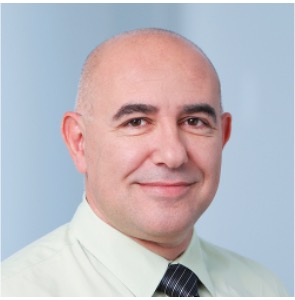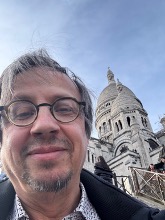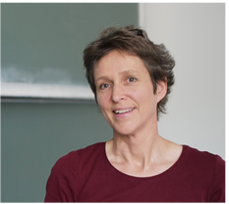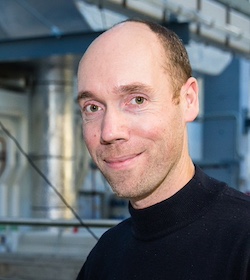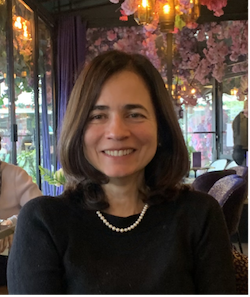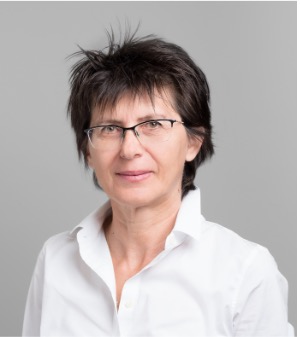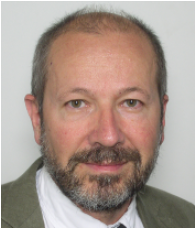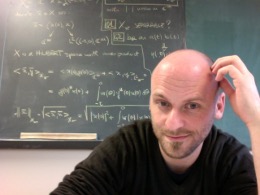
|
|
|
Plenary SpeakersIFAC Tri-Event Plenary Speakers: Mustafa H. Khammash (CH)
Abstract: Feedback regulation is fundamental to biology, allowing cells to maintain stability and adapt to changing environments. Can we harness these principles to engineer synthetic control systems in living cells? In this talk, I will explore the design of genetic circuits that ensure precise regulation of key cellular variables despite external and internal perturbations. I will introduce the structural constraints required for such control, revealing a novel internal model principle (IMP) for biomolecular networks. Finally, I will showcase synthetic controllers implemented in living cells, demonstrating their adaptability, tunability, and potential applications in biotechnology and medicine. This work advances our ability to engineer predictable and intelligent cellular behavior—paving the way for programmable life. Biography: Professor Mustafa Khammash works in the field of Control Theory and Systems and Synthetic Biology. He is currently a professor at the Department of Biosystems Science and Engineering (D-BSSE) at ETH Zurich. Prof. Khammash received his Ph.D. from Rice University in 1990 in Electrical Engineering. After completing his Ph.D., he joined the Electrical Engineering Department at Iowa State University, where he established the Dynamics and Control Program. In 2001, he became a member of the Mechanical Engineering faculty at the University of California, Santa Barbara (UCSB). During his tenure at UCSB, he served as the Director of the Center for Control, Dynamical Systems, and Computation. In 2011, Prof. Khammash moved to Switzerland, joining ETH Zurich. He has held various positions there, including serving as the head of the Department of Biosystems Science and Engineering. His research at ETH Zurich involves working at the interface of systems biology, synthetic biology, and control theory. His work is pivotal in the development of Cybergenetics in synthetic biology, focusing on the real-time control of the dynamic behavior of living cells with applications in various areas such as industrial biotechnology, tissue engineering, and medical therapy. His laboratory at ETH Zurich combines expertise from various disciplines, including engineering, mathematics, computational science, physics, and biology, to advance the theoretical and experimental foundations of Cybergenetics. Prof. Khammash is a Fellow of the IEEE, IFAC, the Japan Society for the Promotion of Science, and the Asia-Pacific Artificial Intelligence Association. He is the winner of the prestigious European Research Council Advance grant (2018) and the Swiss National Science Foundation Advanced grant (2023).
Wim Michiels (BE)
Title: From Lissajous curves, slack variables and small solutions to constructive design methods for time-delay systems. Abstract: In my presentation, I will give a control-oriented overview of time-delay systems, touching on core ideas behind some recent developments. After motivating the flexible modeling framework in terms of delay-differential algebraic equations, I will briefly outline analysis and design methods for structured feedback controllers for generic time-invariant time-delay systems of retarded and neutral type. Next, I will present a survey of two complementary controller-induced reduction methods for systems with input/output delay, that allow rendering the closed-loop system in some sense finite-dimensional. The first one is based on including predictors to compensate delays in the control loop. The second, much less well-known reduction technique, consists of using periodic output feedback. It will be shown that an appropriate design of the time-varying gains renders the monodromy operator of the closed-loop system finite-dimensional. Moreover, this matrix can be made nilpotent or even zero, leading to convergence in a fixed time. In several situations, the convergence time can even be prescribed, which has major impact on design problems with hard time-bound constraints on control and estimation. Finally, some applications complete the presentation, with a particular focus on delay-based vibration control techniques. The title is intended to gradually get a meaning during the presentation. Biography: Wim Michiels is currently a full professor at KU Leuven, where he leads a research team within the Numerical Analysis and Applied Mathematics (NUMA) section. His research interests include mathematical systems theory, dynamical systems, control and optimization, numerical linear algebra and scientific computing. His work focuses on the analysis and control of systems described by functional differential equations and other infinite-dimensional systems, on control of systems with a network structure, and on large‐scale numerical linear algebra problems. He has published in a variety of journals in computational and applied mathematics, control theory, optimization and dynamical systems. He is lead author of the book Stability, Control and Computation of Time-Delay Systems, SIAM, 2014 (2nd edition). He coordinated the H2020 Innovative Training Network UCoCoS on the analysis and control of complex systems. He has been Associate Editor of the IEEE Transactions on Automatic Control, Systems & Control Letters, Communications in Nonlinear Science and Numerical Simulation, Calcolo, Kybernetika and area editor of the Springer book series Advances in Delays and Dynamics. Currently, he is co-leader of the IFAC Working Group on Time-Delay Systems. He has been co-organizer of the ILAS 2016 and EUCCO 2015 conferences at KU Leuven, IPC (co)chair of the IFAC Workshop on Time-Delay Systems (2016, 2021), the IFAC Workshop on Periodic Control Systems (2016) and will be IPC Chair and co-organizer of the 2027 European Control Conference. He is a passionate teacher of six yearly courses at KU Leuven and courses in international PhD training programs (EECI-GSSI, SOCN, CISM, DISC, Gran Sasso Science Institute). He has been a member of the KU Leuven Research Council.
Eva Zerz (DE) Title: Controlled invariance and collision-freeness: a symbolic computation point of view. Abstract: The study of invariant sets is vital for analysing the qualitative behaviour of dynamical systems. These are subsets of the state space from which the trajectories of an ODE system cannot escape. From a control perspective, one aims at rendering given sets invariant by imposing appropriate (state or output) feedback laws. We will approach these goals from a constructive and computational angle, first focusing on polynomial systems and algebraic varieties, then extending the system class. As an example, we will discuss the concept of collision-freeness, a structural property that many mathematical models of particle interactions possess naturally due to their built-in symmetries. Biography: Eva Zerz studied Mathematics at the University of Innsbruck, Austria, and received her Ph.D. degree in 1994. She then joined the Systems and Control Group at the Department of Mathematics of the University of Kaiserslautern, Germany, where she completed her habilitation in 2000, with a thesis on algebraic systems theory. Subsequently, she held a lecturer position there. In 2005, she became an associate professor of algebra at RWTH Aachen University, Germany. Her fields of research are mathematical control theory and computer algebra. She is a member of the editorial boards of Advances in Delays and Dynamics, Mathematics of Control, Signals, and Systems, and Multidimensional Systems and Signal Processing. Currently, she serves as avice-chair on educational activities of IFAC Technical Committee 2.2.
COSY 2025 plenary speakers: Rudy Negenborn (NL)
Abstract: In this talk we will address the importance of control & automation in the shipping and logistics sector. We will focus on recent advances in the ports and waterborne transport area, starting from the equipment level. We will first discuss the growing interest in smart / autonomous ships. We hereby highlight six open research gaps and discuss challenges and solution directions from an individual ship perspective, as well as from the perspective of multi-vessel systems with ship-2-ship and ship-2-infrastructure interaction. We then make the link to the transport domain, presenting the approach taken by the European H2020 program NOVIMOVE. This program aims at solving inefficiencies specifically on the IWT Rhine-Alpine corridor via “condensing” of the logistics system by improving container load factors, by reducing waiting times in seaports, by improved river voyage planning and execution, and by facilitating smooth passages through bridges and locks. This can, with the right stakeholder involvement, ultimately lead to better aligned and sustainable operations, and improved use of transport capacity. Throughout the talk, we will emphasize the underlying real-time control and decision making challenges that need to be tackled to move towards autonomous ships and smart logistics. Biography: Prof.dr. Rudy Negenborn is full professor in Multi-Machine Operations & Logistics at Delft University of Technology. He is head of the Section Transport Engineering & Logistics, and leads the Researchlab Autonomous Shipping (RAS). His research interests include automatic control and coordination of transport technology, with a focus on smart shipping and smart logistics applications. With his team, he proposes multi-agent and model predictive control approaches that benefit from real-time information and communication potential. He has over 300 peer reviewed publications and leads NWO, EU and industry funded research, such as the Horizon 2020 program NOVIMOVE. Besides, he is editor of the books “Intelligent Infrastructures”, “Distributed Model Predictive Control Made Easy”, and “Transport of Water versus Transport over Water”. With the MSc track Multi-Machine Engineering at TUDelft, Negenborn connects scientific insights with education to prepare the next generation of MSc engineers for the grand challenges in the maritime and transport domain.
Title: State estimation of logic and timed discrete-event systems. Abstract: Discrete event systems (DES) are mathematical models used to describe and analyze systems where state changes occur at discrete points in time due to asynchronous discrete events. Logical DES focus on the sequence of events without explicitly considering time. In contrast, timed DES extend this approach by incorporating temporal constraints, enabling the modeling of delays and deadlines. DES are extensively used in the study of man-made systems, such as manufacturing, communication networks, and automation. They allow for the formulation of a wide variety of problems, including state estimation, analysis, control, fault diagnosis, and many others. In this talk, the focus is on state estimation. We first provide some basic formulations of the problem for purely logical DES under the assumption of reliable sensor information. Then, we examine how these problems become more challenging when sensor information is unreliable. In the second part of the talk, the focus shifts to timed DES. Specifically, we investigate state estimation in a timed probabilistic setting. We present some analytical results for a special class of timed DES called labeled continuous-time Markov models. Additionally, we demonstrate how timed probabilistic state estimation can be performed for larger classes of timed DES using neural networks. The talk concludes with a discussion of relevant open issues and promising research directions in this field. Biography: Carla Seatzu is Full Professor of Automatic Control at the University of Cagliari, Cagliari, Italy. Her research interests are: discrete event systems, Petri nets, hybrid systems, networked control systems, manufacturing and transportation systems. She is the author/co-author of over 290 publications, including 100+ articles in international journals and one textbook. She is the editor of two international books. Her h-index in Scopus is equal to 40. Prof. Seatzu is Department Editor of Discrete Event Dynamic Systems; she is Senior Editor of the IEEE Transactions on Automation Science and Engineering and of the International Journal of Robotics and Research. She has been Senior Editor of the IEEE Control Systems Letters and Associate Editor of many international journals including the IEEE Transactions on Automatic Control. She is General co-Chair of the 11th Int. Conference on Control, Decision and Information Technologies; was Program Chair of the 20th IEEE International Conference on Automation and Science Engineering, and of the 23rd IEEE International Conference on Emerging Technologies and Factory Automation in 2018; Workshop Chair of the 55th IEEE Conference on Decision and Control in 2016, and General Co-Chair of the 18th IEEE International Conference on Emerging Technologies and Factory Automation in 2013. Since 2020 she is Chair of the IFAC Technical Committee TC1.3 on Discrete Event and Hybrid Systems. She has been a Visiting Professor in universities in Spain, (Zaragoza), USA (Atlanta), Mexico (Guadalajara), and China (Xi’an, Hangzhou).
SSSC 2025 plenary speakers: Lacra Pavel (CA)
Title: On System Theory for Learning in Games. Abstract: In this talk we focus on the role played by system theory in analysis and design of learning algorithms in games. Over the years, a plethora of algorithms/dynamics have been proposed: from best-response play, (projected) gradient-play and prox- imal dynamics to fictitious-play, payoff-based play or Q-learning (reinforcement- learning), the list is long. Why is it that in certain game settings some algorithms work while others don’t? How can we relax their assumptions and how can we generalize them in a systematic manner? This is a topic of increased interest in recent years. In this talk we review some of our group’s contributions towards answering them. Our approach is based on exploiting system theory principles and connections to passivity/dissipativity. We show that some popular game-theoretic algorithms can be cast as instances of a feedback interconnection between a dissipative/passive dynamical system and some game mapping. Once this is done, convergence analysis of learning dynamics follows from standard passivity theory, based on simple and concise arguments. Moreover, we show how passivity-inspired ideas can be used to design novel algorithms and learning dynamics, for both Nash and generalized Nash equilibrium problems. We follow with discussion of higher-order learning dynamics designed based on passivity. We close with extensions to learning for agents with intrinsic dynamics. Biography: Lacra Pavel is a Professor in the Systems Control group, Department of Electrical and Computer Engineering, University of Toronto, Canada. She received the Diploma of Engineer in Automatic Control from Technical University Iasi, Romania and the Ph.D. degree in Electrical Engineering from Queen’s University, Canada. She joined University of Toronto in 2002, after a postdoctoral stage at the National Research Council and four years of working in the communication industry. Her re- search interests are in game theory and distributed optimization in networks, with emphasis on dynamics and control methods. She is the author of the book Game Theory for Control of Optical Networks (Birkhäuser-Springer Science). She is an IEEE Fellow, currently acting as the Editor-in-Chief for the IEEE Transactions on Control of Network Systems and as an Associate Editor for the IEEE Transactions on Automatic Control.
Pierre Rouchon (FR) Title: Quantum error correction and feedback. Abstract: Quantum error correction relies on a feedback loop. This feedback generally corresponds to a classical controller. Quantum error correction can also exploit the dissipation associated with the phenomenon of decoherence. Called autonomous correction by physicists, it then uses feedback where the controller is a dissipative quantum auxiliary system. This talk focuses on the development of such quantum controllers to stabilize logical qubits encoded in harmonic oscillators (bosonic code). Two types of encoding will be considered: cat-qubit encoded in two coherent states of opposite phases for which bit-flip errors induced by usual noises can be experimentally almost suppressed; GKP-qubit encoded in finite energy grid-states approximating position/impulsion Dirac combs where, in principle, both bit-flips and phase-flips could be almost suppressed. Biography: Pierre Rouchon is professor with the Centre Automatique et Systemes at Mines Paris, Université PSL and member of "Académie des Sciences". He graduated from Ecole Polytechnique in 1983, has obtained a PhD in 1990 and an “habilitation à diriger des recherches” in 2000. From 1993 to 2005, he was associated professor at Ecole Polytechnique in Applied Mathematics. From 1998 to 2002, he was the head of the Centre Automatique et Systèmes. From 2007 to 2018, he was the chair of the department “Mathématiques et Systèmes” at Mines-Paris. Since 2015, he is a member of the Quantic Research team between Inria, Ecole Normale Supérieure de Paris, CNRS and Mines Paris. His fields of interest include nonlinear control and system theory with applications to physical systems. His contributions include differential flatness and its extension to infinite dimensional systems, non-linear observers and symmetries, quantum filtering and feedback control. In 2017, he received the “Grand Prix IMT – Académie des sciences de Paris.” He is the principal investigator of the ERC Advanced Grant "Quantum Feedback Engineering" (2021-2026).
TDS 2025 plenary speakers: Dimitri Breda (IT)
Title: Time evolution and time delays: a walk through semigroups, generators, evolution families and their discretizations. Abstract: Since the seminal works of Krasovskii in the 1950s, interpreting delay equations as dynamical systems evolving on function spaces has significantly advanced our understanding of their behavior. Indeed, the fundamental principles of continuous-time evolution hold (almost) unchanged at the price of shifting from the finite-dimensional physical context to the infinite-dimensional dynamical one. In this talk I will try to offer a general overview of the key tools from semigroup theory and evolution on Banach spaces, along with numerical counterparts. The latter are used to bring the theoretical objects back to finite dimension in view of practical solutions to complex problems. On the way, I will discuss some recent developments regarding possible applications, as well as related convergence aspects in the transition from the finite to the infinite and backward. Biography: Dimitri Breda received the Laurea degree in mechanical engineering from the University of Udine, Italy, in 1998 and the Ph.D. in computational mathematics from the University of Padua, Italy, in 2004. He is full professor of numerical analysis at the Department of Mathematics, Computer Science and Physics of the University of Udine, where he established and currently leads the Computational Dynamics Laboratory (CDLab http://cdlab.uniud.it/), and presently coordinates the degree courses (BSc and MSc) in Mathematics. His research interests are in the broad field of numerical and applied mathematical analysis, with particular reference to stability and bifurcation of delay and other classes of functional equations, related to control engineering and population dynamics, but he doesn't mind occasionally taking a leap into chaotic systems or data-driven tools. He is an associate editor of the Journal of Computational and Applied Mathematics, member of the IFAC working group ‘‘Time Delay Systems’’ (TC 2.2) and serves regularly the IPC of the IFAC workshop series on ‘‘Time Delay Systems’’.
Tomás Vyhlídal (CZ)
Title: Optimized Active Vibration Absorbers with Time-Delayed Feedback for Non-Collocated and Multi-Dimensional Applications Abstract: In the 1990s, Nejat Olgac and his collaborators recognized the advantages of time-delayed feedback for vibration absorption, leading to the systematic development of the Delayed Resonator concept. By introducing a carefully designed time delay into the feedback loop, a physical vibration absorber can be turned into an ideal resonator, capable of fully absorbing vibrations at a target frequency. In this talk, I will focus on recent developments and various extensions of the Delayed Resonator concept. Starting with the classical configuration, I will discuss its spectral and frequency-domain characteristics, as well as methods for enhancing its robustness. I will then address the highly challenging problem of non-collocated vibration absorption by the Delayed Resonator, with an emphasis on spatial and spectral tunability, energy needs, system stability, and structural integrity. It will be shown - and experimentally validated - that all these aspects can be effectively managed through integrated, optimization-based design. Next, I will outline the design of a planar vibration absorber featuring three actuators controlled by delayed feedback. This will include structural optimization, frequency-domain analysis of the resulting MIMO system, its practical implementation and experimental validation. Finally, I will present first results on a spatial vibration absorberincorporating six delayed-feedback actuators. Biography: Tomáš Vyhlídal received his Ph.D. in Control and Systems Engineering in 2003 from the Faculty of Mechanical Engineering, Czech Technical University in Prague (CTU). In 2012, he was appointed Professor at CTU in the field of Control and Systems Engineering.Since 2000, he has been with the Department of Instrumentation and Control Engineering at the Faculty of Mechanical Engineering (head of department since 2019), and since 2015, he has also been with the Czech Institute of Informatics, Robotics and Cybernetics (CIIRC), both at CTU. His research interests include the analysis and control of time-delay systems, mathematical modelling, and applied control theory. He has coordinated several projects funded by the Czech Science Foundation, focusing on the application of time-delay algorithms for flexible mode compensation and vibration suppression. Currently, he serves as a Research Area leader in the ROBOPROX.EU project, focusing on the control of distributed-parameter systems and complex robotic structures. Since 2013, he has been a member of the IFAC Technical Committee on Linear Control Systems, vice-chair for industry from 2017 to 2023.
|
